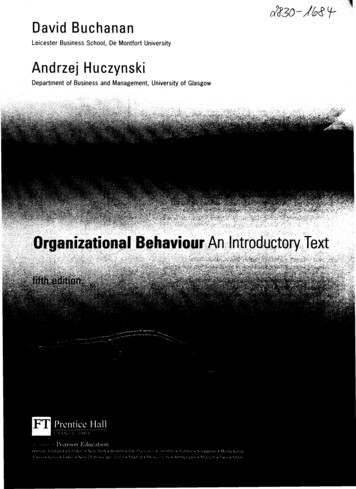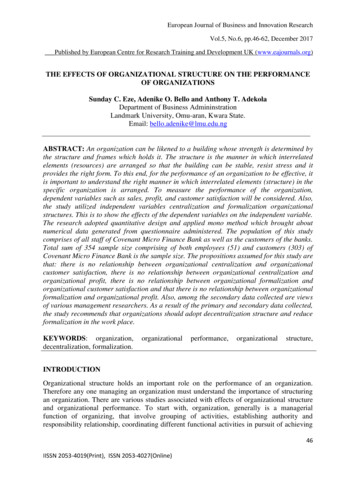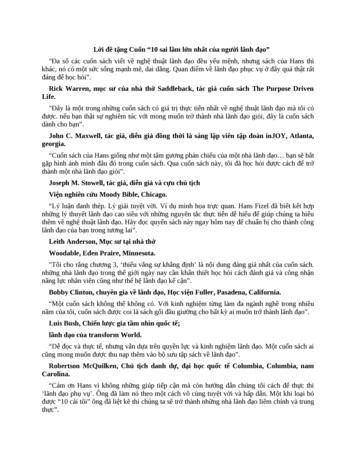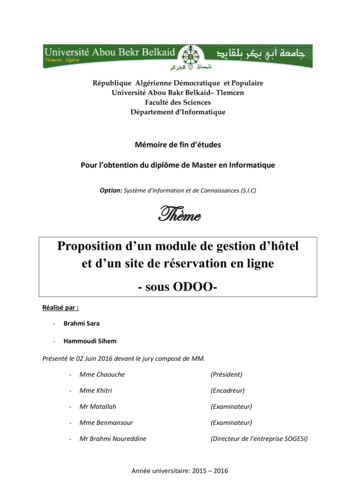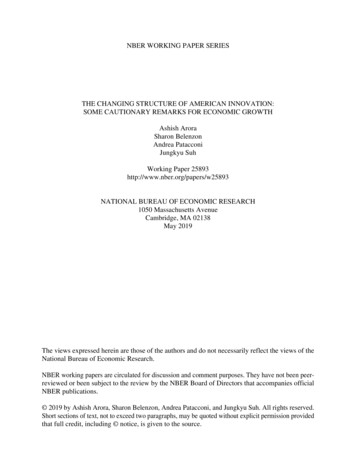
Transcription
NBER WORKING PAPER SERIESTHE CHANGING STRUCTURE OF AMERICAN INNOVATION:SOME CAUTIONARY REMARKS FOR ECONOMIC GROWTHAshish AroraSharon BelenzonAndrea PatacconiJungkyu SuhWorking Paper 25893http://www.nber.org/papers/w25893NATIONAL BUREAU OF ECONOMIC RESEARCH1050 Massachusetts AvenueCambridge, MA 02138May 2019The views expressed herein are those of the authors and do not necessarily reflect the views of theNational Bureau of Economic Research.NBER working papers are circulated for discussion and comment purposes. They have not been peerreviewed or been subject to the review by the NBER Board of Directors that accompanies officialNBER publications. 2019 by Ashish Arora, Sharon Belenzon, Andrea Patacconi, and Jungkyu Suh. All rights reserved.Short sections of text, not to exceed two paragraphs, may be quoted without explicit permission providedthat full credit, including notice, is given to the source.
The Changing Structure of American Innovation: Some Cautionary Remarks for EconomicGrowthAshish Arora, Sharon Belenzon, Andrea Patacconi, and Jungkyu SuhNBER Working Paper No. 25893May 2019, Revised August 2019JEL No. O3ABSTRACTA defiining feature of modern economic growth is the systematic application of science to advancetechnology. However, despite sustained progress in scientific knowledge, recent productivity growthin the U.S. has been disappointing. We review major changes in the American innovation ecosystemover the past century. The past three decades have been marked by a growing division of labor betweenuniversities focusing on research and large corporations focusing on development. Knowledge producedby universities is not often in a form that can be readily digested and turned into new goods and services.Small firms and university technology transfer offices cannot fully substitute for corporate research,which had integrated multiple disciplines at the scale required to solve significant technical problems.Therefore, whereas the division of innovative labor may have raised the volume of science by universities,it has also slowed, at least for a period of time, the transformation of that knowledge into novel productsand processes.Ashish AroraFuqua School of BusinessDuke UniversityBox 90120Durham, NC 27708-0120and NBERashish.arora@duke.eduSharon BelenzonFuqua School of BusinessDuke University100 Fuqua DriveDurham, NC 27708and NBERsharon.belenzon@duke.eduAndrea PatacconiNorwich Business SchoolUniversity of East AngliaNorwich, NR4 7TJUnited KingdomA.Patacconi@uea.ac.ukJungkyu SuhDuke UniversityFuqua School of Businessjungkyu.suh@duke.edu
1IntroductionA defining feature of modern economic growth is the systematic application of science to advancetechnology. Many innovations that spurred economic growth in the twentieth century, including synthetic fibers, plastics, integrated circuits, and gene therapy, originated from advances in the naturalsciences, engineering and medicine. Science, by producing “a potential for technology far greater thanexisted previously,” clearly distinguishes modern economic growth from previous economic epochs(Kuznets, 1971).However, despite sustained increases in the quantity of scientific knowledge, productivity growthin most advanced economies has stagnated in recent decades in comparison to a “golden age” in themid-twentieth century. Using data from the United States, Gordon (2016) shows that real GDP perhour (i.e., labor productivity) grew substantially in the middle of the twentieth century, from 1.79percent per year between 1870 and 1920 to 2.82 percent per year between 1920 and 1970. However,in the most recent period (1970-2014), productivity grew by a modest 1.62 percent per year. Gordonconcludes that productivity rose between 1920 and 1970 largely because of significant technologicalprogress, but more recently technical advance has been much less potent in spurring growth. Thisslowdown is surprising given the sustained expansion of scientific input (measured in terms of researchdollars s
Duke University Box 90120 Durham, NC 27708-0120 and NBER ashish.arora@duke.edu Sharon Belenzon Fuqua School of Business Duke University 100 Fuqua Drive Durham, NC 27708 and NBER sharon.belenzon@duke.edu Andrea Patacconi Norwich Business School University of East Anglia Norwich, NR4 7TJ United Kingdom A.Patacconi@uea.ac.uk Jungkyu Suh Duke .



